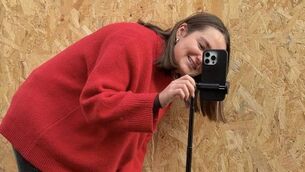Dr Michelle O'Driscoll: What should we include in our wellbeing toolkit?

A longer out-breath compared to the in-breath signals to the body that all is well and safe, and brings it back from high activation to rest and digest mode, says Dr Michelle O'Driscoll.
When we get stressed or overwhelmed, our physiology reflects this through the hormones that are released and the symptoms that we experience in our bodies.
When we’re younger, we rely on others to provide us with regulation in times where we experience big, challenging emotions (a need that may or may not have been met) – but as adults we are expected to have the tools to regulate ourselves. If we weren’t taught this in childhood, it may not come naturally, but it is something that we can work on and develop over time for ourselves.
The types of things that can regulate us are varied, and there’s no one-size-fits-all all. The prescribing of specific strategies doesn’t suit all, nor do they meet our needs across all of the situations we may face.
Having a selection of skills, practices and coping mechanisms in our toolbox that we know work well for us in certain scenarios is a really helpful way of increasing our capacity to deal with what life might throw at us.
Exercise – burning off the adrenaline that gets released in times of stress or overwhelm can be a great way to regulate and calm the nervous system.
It boosts endorphins and really contributes to a renewed sense of calm and wellbeing.
It gives a feeling of accomplishment, and a natural high that can overcome the feelings of defeat of overwhelm that we could be experiencing.
Breathing exercises – these can vary in terms of their structure, but generally they focus on firstly increasing the depth of the breath, as shallow breathing tells the mind that you’re under pressure while deep breathing resets that stress response.
Secondly, one can tailor the length of the in-breath versus the out-breath.
A longer out-breath compared to the in-breath signals to the body that all is well and safe, and brings it back from high activation to rest and digest mode.
Grounding – when we’re dysregulated, our thoughts can take off at a million miles an hour, down rabbit holes and unhelpful spirals of negativity.
Using a spotlight approach to the sensations in our bodies if it feels safe to do so, can be a really effective approach to regulation.
Connecting with our weight in the seat or our feet on the floor can quite literally bring us back down to earth from a place of uncertainty or overthinking.
Relaxation or awareness techniques – having a list of activities that help you to just rest physically and mentally is a great way to bring the body down from high-level stress.
Reading, walking, listening to a podcast, painting, anything that takes you out of your head and into a flow state will benefit you here, and deserves a place in your regulation toolkit.
Connection – we’ve often highlighted the importance of connection to our wellbeing, and its effect on dysregulation is no different.
Just as a child looks to their trusted adult to support their regulation efforts, we too can benefit from leaning on somebody more regulated and steady than us in that moment to regain clarity and a sense of safety.
Reaching out can be challenging, but always reminding yourself of who those people might be, and their willingness to step up as that support for us is really important.
In times of stress and challenge, we can come to feel like we might be perceived as a burden, which most often times is not the case at all.
Cold therapy – sea swims, cold showers and icebaths are popular for a reason – their ability to reset the nervous system and combat stress in the body is evident.
While they may not be for everybody, they’re certainly something to consider having in the toolkit to try at times where you feel overwhelmed or under pressure.
Nature – as clichéd as it sounds, getting out into the nature around us can be therapeutic, humbling and thought-provoking. It can put our troubles into perspective, and give us space to process our challenges. Incorporating fresh air and outdoor activities into your day or week is a vital part of most wellbeing toolkits.
Regulation in stressful situations can be challenging, but improves with practice and the right support around us. The toolkit that we create for ourselves can really help to maximise our ability to regulate and maintain a reliable level of wellbeing.







 App?
App?


